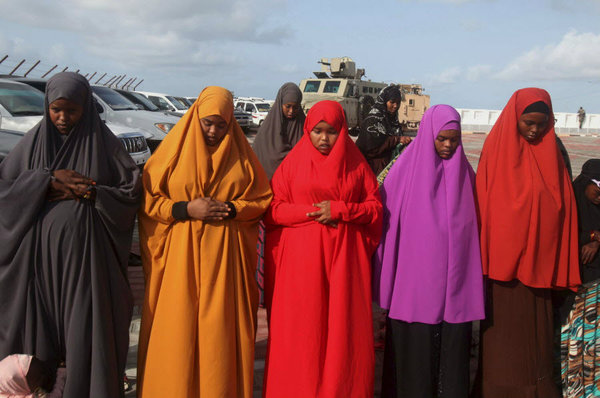
Wednesday August 5, 2015

Women take part in morning prayers to celebrate the first day of the Muslim holiday of Eid-al-Fitr, marking the end of the holy month of Ramadan, in Somalia's capital Mogadishu, July 17, 2015. On Aug. 4, the Somali government announced plans to introduce a bill that would prohibit female genital mutilation and cutting nationwide.
Somalia may soon take a crucial step toward ending female genital mutilation and cutting.
The country’s Minister of Women and Human Rights has announced plans to introduce a bill banning the practice nationwide, Somali news outletHorseed Media reported Tuesday. The decision would make the East African nation the latest to move forward with legislation against FGM/C – an important part of efforts to terminate the dangerous but deep-rooted custom, experts say.
“[The] time has come for us to eradicate this bad practice and protect the rights of girls and women in our country,” said Sahra Mohammed Ali Samatar, Somalia’s Minister of Women and Human Rights.
FGM/C – which involves the altering, injuring, or removal of the external genitalia of women or girls for non-medical reasons and has been condemned by the United Nations as a human rights violation – affects about 100 to 140 million girls worldwide, the majority of whom reside in Africa, according to the World Health Organization.
In terms of absolute incidences, the nation with the highest prevalence of FGM/C is Egypt, where over 27 million women have been mutilated to date. Somalia, however, tops the list when it comes to proportion of the population: 98 percent of girls in the country are subject to the practice, which is performed mostly on children ages 4 to 11, according to UNICEF.
But change is afoot, as the risks of the practice – which include emotional, physical, and psychological trauma and, in some cases, death – make their way into public awareness and discourse. Egypt, for instance, outlawed the practice in 2008, and has since seen the issue increasingly broached within families and communities.
“There is definitely a shift on the ground in terms of the openness of people,” Mona Amin, who runs the Egyptian National Population Council’s FGM/C campaign, told The Guardian. “Young girls don’t feel embarrassed to talk about the problems of the practice in front of their parents … It’s a very important shift in attitude.”
Kenya also banned the practice in 2011. In May, just before he left office, former Nigerian president Goodluck Jonathan signed into law a nationwide ban on FGM/C – a move that many saw as his way of ensuring his legacy included fighting for women’s rights and protections, The Huffington Post reported.
And indeed, concrete legislation is "an important framework to have in place, and shows a commitment from the government," Cody Donahue, a child protection specialist for UNICEF, says in a phone interview.
Still, banning the practice is just one step towards ending it, he says. FGM/C is still a reality for about 92 percent of married Egyptian women between 15 and 49 years old, according to a government report released in May. Women’s rights advocates have raised similar concerns about Kenya and Nigeria.
The problem, says Mr. Donahue, is that inherited traditions and complex belief systems surround the practice, and cultures that perform FGM/C tend to tie it to a woman’s purity, spirituality, or coming of age. "Parents believe it's important for the full development of the girl and an important prerequisite for marriage," he says. "Even if you have doubts about [the practice], the fact that others expect you to do it helps to hold it in place."
Which is why it's critical not only that laws against FGM/C be passed, but that parents, teachers, and community and religious leaders are made aware of them and trained to discuss them and encourage their enforcement, Donahue says.
As The Christian Science Monitor reported in 2013:
"The most successful anti-FGM campaigns have bound together legislation ... with community-led programming to reduce the stigma of not undergoing FGM. [W]hile FGM may seem like an incredibly intimate and individual act, it is an intricate part of the social structure of many communities. So the entire community must "buy in" to efforts to end the practice."
“Global experience tells us that ultimately, it's through changing attitudes, not just laws, that we will end FGM,” Tanya Barron, chief executive of children’s nonprofit Plan International, told Reuters.